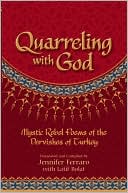 This collection presents, for the first time in English, a compilation of seven centuries of the mystic hymns of Turkey's rebellious Sufi poets the popular folk counterparts to Rumi whose poems are characterized by a passionate and unorthodox commitment to Truth. At the time Rumi was writing in ancient Anatolia, many other great mystics in the region were also composing wild, ecstatic, and controversial poems that were circulated among the people as spiritual songs and are still played and sung today in sacred dervish ceremonies and gatherings. The poems present a spiritual tradition from the Islamic world that bravely challenged orthodox religion and emphasized universal mystic love and tolerance.
This collection presents, for the first time in English, a compilation of seven centuries of the mystic hymns of Turkey's rebellious Sufi poets the popular folk counterparts to Rumi whose poems are characterized by a passionate and unorthodox commitment to Truth. At the time Rumi was writing in ancient Anatolia, many other great mystics in the region were also composing wild, ecstatic, and controversial poems that were circulated among the people as spiritual songs and are still played and sung today in sacred dervish ceremonies and gatherings. The poems present a spiritual tradition from the Islamic world that bravely challenged orthodox religion and emphasized universal mystic love and tolerance.More: Quarreling with God » Barnes & Noble.com
